| Srl | Item |
| 1 |
ID:
151544
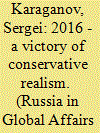

|
|
|
|
|
| Summary/Abstract |
In the winter of 2014, two months before the events in Crimea, when it was already clear that the confrontation with the West was getting increasingly tense, I read again Leo Tolstoy's War and Peace. I was struck by a phrase that had not caught my attention before: "A battle is won by those who firmly resolve to win it." I realized then that Russia would resolve and win.
|
|
|
|
|
|
|
|
|
|
|
|
|
|
|
|
| 2 |
ID:
153454
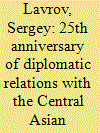

|
|
|
|
|
| Summary/Abstract |
Minister of Foreign Affairs of the Russian Federation
|
|
|
|
|
|
|
|
|
|
|
|
|
|
|
|
| 3 |
ID:
055403


|
|
|
| 4 |
ID:
088474
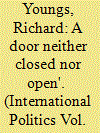

|
|
|
|
|
| Publication |
2009.
|
| Summary/Abstract |
Ukraine provides evidence of very different Common Foreign and Security Policy negotiating dynamics. In the run up to the country's Orange Revolution, significant differences persisted between member states over how the European Union (EU) should support Ukraine's democratic transition. A combination of normative entrapment and co-operative bargaining ensured that 'maximalist' and 'minimalist' member states united around a common position in support of the Orange Revolution. In subsequent debates over whether the EU should offer Ukraine a membership prospect, however, lowest common denominator dynamics prevailed. This case additionally demonstrates that both before and after Ukraine's democratic transition very specific external geostrategic factors played an important role in conditioning EU policy outcomes
|
|
|
|
|
|
|
|
|
|
|
|
|
|
|
|
| 5 |
ID:
020140
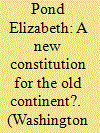

|
|
|
|
|
| Publication |
Autumn 2001.
|
| Description |
29-40
|
|
|
|
|
|
|
|
|
|
|
|
|
|
|
|
| 6 |
ID:
119723
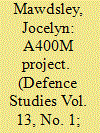

|
|
|
|
|
| Publication |
2013.
|
| Summary/Abstract |
The A400M project was seen as a flagship European armaments cooperation project from its inception. It has been farmed in two different ways ; as a break with inefficient collaborative procurement practices (the commercial fame) and as proof that European interests would outweigh national ones (the European fame).The Project's well-documented difficulties show that neither frame was wholly persuasive, but this raises questions about the viability of EU armaments policy given that it rests largely on the same assumptions.
|
|
|
|
|
|
|
|
|
|
|
|
|
|
|
|
| 7 |
ID:
167291
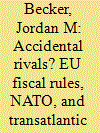

|
|
|
|
|
| Summary/Abstract |
Both theorists and practitioners continue to show interest in transatlantic burden-sharing. Resource allocation choices – both to and within defense budgets – are grand strategic choices, and membership in alliances and security communities affects how states make those choices. International security and political economy scholarship offers plausible explanations for transatlantic imbalances in military expenditures. However, NATO allies and EU member-states have pledged to one another not just to spend more on defense, but to allocate more defense resources to equipment modernization. Current scholarship does not fully explain the sources of such within-budget choices, which would help anticipate the likelihood of such pledges succeeding. Building on work by security scholars, defense and political economists, and scholars of interorganizational relations, I argue that stringent fiscal rules dampen the kind of defense spending NATO and EU strategists seek. Governments respond to increasingly stringent fiscal rules by reducing overall defense expenditures, while at the same time shifting existing defense resources to personnel, and away from equipment and operational expenditures. I find evidence in support of this argument by using education levels in the states in question as instruments for fiscal rules. This phenomenon represents a significant risk for important transatlantic strategic initiatives, namely NATO’s Wales pledge on defense investment.
|
|
|
|
|
|
|
|
|
|
|
|
|
|
|
|
| 8 |
ID:
103994
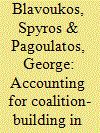

|
|
|
|
|
| Publication |
2011.
|
| Summary/Abstract |
Which parameters affect coalition building in budgetary negotiations? In this article, three distinct levels of analysis are identified to account for coalition building patterns, associated with domestic politics, domestic socioeconomic structures and EU politics. At the level of domestic politics, ideology points to cross-governmental affinity of a partisan nature; at the level of socioeconomic structures, similarity of policy interests, generated by cross-national socioeconomic convergence with EU policy standards, informs coalition formation patterns; at the EU politics level, the intergovernmental power balance influences the political aspirations of each Member State in the integration process and coalition-building decisions. Two sets of parameters affect the evolution of EU coalition patterns, corresponding to the integration impact on the EU (new cleavages) and on the Member States (the impact of Europeanisation). This analytical framework is used to examine the southern coalition (Spain, Greece, Portugal) in the four multi-annual financial frameworks (1988, 1992, 1999 and 2005).
|
|
|
|
|
|
|
|
|
|
|
|
|
|
|
|
| 9 |
ID:
133369
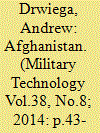

|
|
|
|
|
| Publication |
2014.
|
| Summary/Abstract |
A complete analysis of ISAF's combat commitment within Afghanistan is impossible to summaries in a single article; but, by focusing on specific campaign factors, some lessons for the future can be discerned while a little more time remains with boots on the ground.
|
|
|
|
|
|
|
|
|
|
|
|
|
|
|
|
| 10 |
ID:
125283
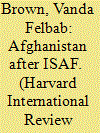

|
|
|
|
|
| Publication |
2013.
|
| Summary/Abstract |
Summer 2013 brought one of the most violent fighting seasons in Afghanistan since the US military and state-building effort began in 2001. On the cusp of the momentous 2014 presidential elections and a year before the majority of international coalition forces would depart from the country in the midst of transferring security functions to the coalition-supported Afghan National Security Forces (ANSF), the Taliban is dug in and still ferocious. It is testing the Afghan security forces, which since June 2013 are supposed to be taking the lead in providing security throughout the country while international forces are increasingly disengaging from combat and departing Afghanistan.
|
|
|
|
|
|
|
|
|
|
|
|
|
|
|
|
| 11 |
ID:
159413
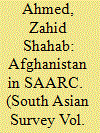

|
|
|
|
|
| Summary/Abstract |
Ever since the formation of the South Asian Association for Regional Cooperation
(SAARC) in 1985, the motivation for the expansion of the Association has been
expressed by its founding members. The prospective expansion comes naturally
to international organisations (IOs), visible in the increase in membership of
the European Union (EU) from six to 28 European countries. Similarly, the
Association of Southeast Asian Nations (ASEAN) has doubled its membership
since its inception. SAARC membership grew in 2007, with the inclusion of
Afghanistan. Yet, there is limited assessment on the opportunities and challenges
that have arisen since Afghanistan’s arrival in SAARC 10 years ago. This article
provides an evaluation of Afghanistan within SAARC, and a further comparison
to processes of enlargement in the EU and ASEAN. It is argued that Afghanistan’s
membership poses significant challenges for SAARC, owing to its political instability.
Its stature as a war-torn country has meant that it has failed to prioritise its role
in the Association. Furthermore, the membership of Afghanistan has significantly
contributed to the conflict relationship between Afghanistan and Pakistan, further
constraining SAARC processes and agendas.
|
|
|
|
|
|
|
|
|
|
|
|
|
|
|
|
| 12 |
ID:
124837
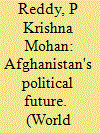

|
|
|
|
|
| Publication |
2013.
|
| Summary/Abstract |
The relationship between Afghanistan and the Shanghai Cooperation Organization (SCO) is a relatively new area of research. This article discusses the interplay between Afghanistan, China and the SCO vis -vis the Bonn 2001 to Bonn 2011 conference. Afghanistan was granted observer status in 2012 in order to facilitate its integration in the wider region and lessen US- NATO influence in the country.
|
|
|
|
|
|
|
|
|
|
|
|
|
|
|
|
| 13 |
ID:
060280
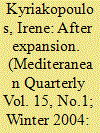

|
|
|
| 14 |
ID:
164651
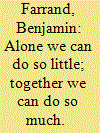

|
|
|
|
|
| Summary/Abstract |
This article demonstrates the role and importance of EU agencies in the EU’s regulatory environment, and considers the consequences of an absence of cooperation through agencies for internal security. It does so by exploring the case study of the anti-counterfeiting activities of the European Union Intellectual Property Office (EUIPO), and what happens when a state no longer benefits from membership of an EU agency. The effective protection of consumers from counterfeit goods is dependent upon identifying best practices, sharing information on counterfeiting trends, and coordinating responses, activities undertaken through EU agencies. This article demonstrates that the ability of states to effectively counter the sale of counterfeit goods is dependent upon the existence of EU agencies due to the need for transnational cooperation. In the absence of EU agencies, states are likely to suffer diminished operational expertise and a lack of in-depth knowledge concerning counterfeiting trends. It concludes that the EU agencies form an essential part of EU security governance, with states not party to these cooperative endeavours rendered vulnerable and unable to combat at a national level what is ultimately a global problem.
|
|
|
|
|
|
|
|
|
|
|
|
|
|
|
|
| 15 |
ID:
103376
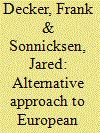

|
|
|
|
|
| Publication |
2011.
|
| Summary/Abstract |
A successful reform of any system of governance must be well informed of the system's own functional logic. In the context of its democratization, this article explores whether the institutional arrangement of the European Union has developed or behaves more like a presidential than a parliamentary system. Building on that, the authors re-examine the opportunities and feasibility of realizing that model as a step towards more democracy in European governance.
|
|
|
|
|
|
|
|
|
|
|
|
|
|
|
|
| 16 |
ID:
056388
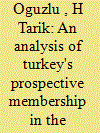

|
|
|
| 17 |
ID:
055488
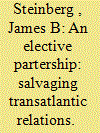

|
|
|
| 18 |
ID:
169749
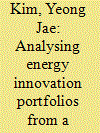

|
|
|
|
|
| Summary/Abstract |
A systemic perspective on energy innovation is required to design effective portfolios of directed innovation activity. We contribute a standardised set of technology-specific indicators which describe processes throughout the energy technology innovation system, ranging from patents and publications to policy mixes, collaborative activity, and market share. Using these indicators, we then conceptualise and develop benchmark tests for three portfolio design criteria: balance, consistency, and alignment. Portfolio balance refers to the relative emphasis on specific technologies. Portfolio consistency refers to the relative emphasis on related innovation system processes. Portfolio alignment refers to the relative emphasis on innovation system processes for delivering targeted outcomes. We demonstrate the application of these benchmark tests using data for the EU's Strategic Energy Technology (SET) Plan which spans six technology fields. We find the SET Plan portfolio generally performs well particularly in areas over which portfolio managers have direct influence such as RD&D funding. However we also identify potential areas of imbalance, inconsistency, and misalignment which warrant further attention and potential redress by portfolio managers. Overall, we show how energy innovation portfolios can be analysed from a systemic perspective using a replicable, standardised set of measures of diverse innovation system processes.
|
|
|
|
|
|
|
|
|
|
|
|
|
|
|
|
| 19 |
ID:
141369
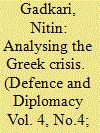

|
|
|
| 20 |
ID:
106476
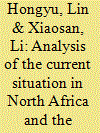

|
|
|